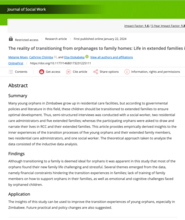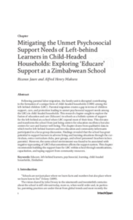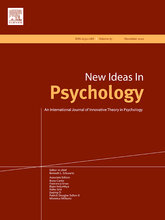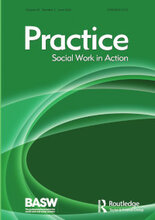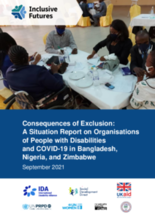Displaying 11 - 20 of 136
Many young orphans in Zimbabwe grow up in residential care facilities, but according to governmental policies and literature in this field, these children should be transitioned to extended families to ensure optimal development. This article provides empirically derived insights to the inner experiences of the transition processes of five young orphans and their extended family members, two residential care administrators, and one social worker.
This webinar introduced new global inter-agency guidance on kinship care. During the webinar, panelists shared key lessons learnt on how to support kinship care, drawing particularly on examples of promising practices from South Africa, Zimbabwe, Liberia, and Brazil.
This video explores why supporting kinship care is so important, and examines how to support kinship care using examples from government and NGOs in Zimbabwe.
This 5th webinar of the Family for Every Child Kinship Care learning series looked at the different ways in which kinship carers themselves support kinship care. Kinship Care Ireland shared how the kinship caregivers they are working with are self-advocating for greater recognition for kinship care.
This research chapter sought to explore the fusion of education and care in schools in Zimbabwe as a holistic system of support for the left-behind at a school where left-behind children expend most of their time.
There exists a gap in care leaving literature about the extent to which the labelling and stereotyping of care leavers during their time in residential care facilities affects their transitions into adulthood. This paper presents an analysis of interviews conducted with care leavers from six childcare facilities in Zimbabwe (n = 30).
This webinar shares the process that Family for Every Child is using to facilitate the development of global inter-agency guidance on Kinship Care, aimed at policy makers and programme managers.
This paper presents findings from a study on care leavers’ experiences of transitional housing at three institutions in Zimbabwe. Using the social sustainability conceptual framework, the study found that transitional housing offers continuity of care, relationships, and a smoother, gradual transition from care to independence.
The COVID-19 pandemic has exacerbated inequalities and barriers to
social inclusion for people with disabilities. These experiences of social
exclusion have been felt to an even greater extent by women with disabilities
and under-represented groups of people with disabilities, leading to a range of
effects on the operations and priorities of OPDs. To address a critical gap in the
evidence base, the Disability Inclusion Helpdesk carried out a rapid assessment
of the role of OPDs during the pandemic, and how the pandemic has affected
OPDs’ operations and priorities.
In this How We Care series webinar, Family for Every Child presented the programming of three CSOs on how they are supporting kin carers and the vulnerable children in their care, in their respective regions.

